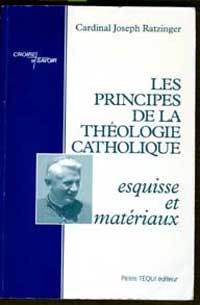In his book The Principles of Catholic Theology, Card. Ratzinger defends that the Bishops should be the representatives of the faithful. The latter, by the grace of Baptism, have conditions to interpret everything. Therefore, the Bishops in their teaching should do nothing more than express the voice of the faithful. In this sense, the Bishops have "a fully democratic function," Ratzinger states.
At right, the cover of the mentioned book. Below, we present our translation of the highlighted French text.
Against the arrogance of the intellectual elite, the Apostle established the insuperable position of the simple Faith and the knowledge that it opens. By the word 'unction' he refers to the catechesis of Baptism and its central components: to Christ, the Son of God, who was anointed by the Holy Spirit and, therefore, to the trinitarian faith. This common knowledge that comes from Baptism is not subject to any higher interpretation, but is the criteria for each person's interpretation. From this the Church lives, she who is the true messenger of the word in the sacrament and in the cathechesis linked to it.
From this, one can clearly see the duty of Bishops as representatives of the Church in relation to theology. Their function as Bishops is not to add another instrument to the orchestra of experts. Their duty is, above all, to be the voice of the simple faith of the people, and of their affirmations in their native simplicity, because the latter have priority over science and run the risk of being set aside when science imposes itself in an absolute way. In this sense, the Bishops have a fully democratic function based not on statistics, but the gift of Baptism.
(Joseph Ratzinger, Les Principes de la Theologie Catholique, Paris: Tequi, 1982. pp. 371-372)
|


 |
|
